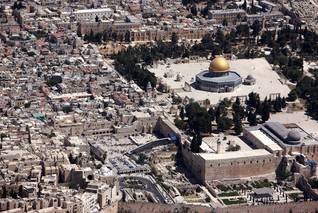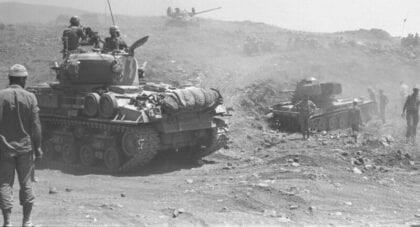From the 2011 documents it becomes clear that the Palestinian negotiators were willing to make far-reaching concessions. Conversely, the documents also reveal that the Israeli negotiators refused to comply with these proposals put forward by the Palestinian negotiators.

Mid-January 2011, al-Jazeera (Doha, Qatar) and The Guardian (London) published confidential documents – the so-called Palestine Papers – offering further insight in the negotiations between Israel and the PLO/PNA. Initial doubts have been allayed about the authenticity of the in total more than 1,600 documents, after Palestinian Saeb Erekat, chief negotiator, admitted that these documents had been leaked by employees of his office.
From the documents, it becomes clear that the Palestinian negotiators were willing to make far-reaching concessions. These included giving up a large part of East Jerusalem; acknowledging the Israeli annexation of large conglomerations of settlements around East Jerusalem and elsewhere; renouncing the right of return of Palestinian refugees who were displaced by Israel in 1947 and afterward, or who fled the acts of war; and the readiness to come down on adversaries of the peace process by use of violence, in cooperation with Israel.
Conversely, the documents also reveal that the Israeli negotiators refused to comply with the proposals put forward by the Palestinian negotiators.
Key Documents
All Palestine Papers summaries are published by permission of al-Jazeera’s Transparency Unit.
5 January 2004
Egyptian Plan for Palestinian Security
Egyptian plan of unspecified origin that details thoughts and proposed directives and benchmarks regarding Phase I of Roadmap implementation. The work plan describes frank Egyptian sentiments, positive and negative, on Palestinian performance and the best way to execute the Roadmap objectives. The plan expresses a desire to ensure multinational task forces work on their objectives and leave matters regarding handling/dismantling groups like Al-Aqsa Brigades to traditional security chiefs and the political leadership; overall it gives Palestinians more credit, leverage and authority in handling matters.
18 March 2005
British Security Plan: Palestinian National Security Force Report
This document, prepared by the UK’s military liaison office, is primarily a set of recommendations for strengthening the Palestinian Security Forces. One annex is a list of projects and goals – everything from training an IT staff to procuring weapons – but few of the goals contain any details about funding or progress. The recommendations contain otes about the extent of the PSF’s collaboration with Israel, and about the UK’s role in determining the makeup of the PSF.
4 February 2008
Meeting Minutes: Ahmed Qurei and Tzipi Livni
Minutes for February 4, 2008 meeting in Jerusalem. Livni mentions recent suicide bombing by Al-Aqsa Martyr’s Brigade and asks if the fighters are part of Fatah. Qurei acknowledges ‘Al-Aqsa Martyr’s Brigade is part of the Fateh movement’. Erekat says Al-Aqsa have been ‘contained after they pledged to hand over all their arm to the Palestinian security apparatuses’, adding ‘Whoever didn’t sign is outside the organization’. There is also discussion about Gaza, and Egypt’s decision to close the border. Qurei tells Livni Israel’s ‘supporting Hamas to segregate Gaza because your aim is seperation’. There is much talk by Palestinian officials about Hamas. Qurei says ‘they will apply Islamic Shari’a and export their regime to neighboring countries’, while Erekat says the battle with the group is ‘unending’.
4 May 2008
Meeting Minutes: Borders with Erekat, Qurei and Livni
Palestinians presented their position regarding borders: 1967 borders along with all areas occupied by Israel in the 1967 area, West Bank with No Man’s Land and East Jerusalem, the Jordan Valley, Gaza Strip and the Dead Sea. Palestinians also presented maps for land swaps – swaps by the ratio of 1:1 (same size and value)
21 May 2008
Meeting Minutes: Post-Annapolis Plenary Session on Territory
Minutes of a post-Annapolis plenary session on Territory. Both sides discussed news reports regarding Israel’s decision to negotiate with Syria over the return of the Golan Heights. However, the majority of the conversation focused on border and territory issues, particularly those regarding East Jerusalem and No Man’s Land. The Israeli side presented their assessment of the Palestinian land swap proposal.
15 June 2008
Meeting Minutes: Trilateral – United States, Israel and Palestine
Minutes of meeting among US, Palestinian and Israeli delegation in Jerusalem for Annapolis negotiations. The sides discuss whether they can reach an agreement before the end of 2008. The conversation primarily focused on the use 1967 borders as a baseline, East Jerusalem, settlement annexation and related issues.
21 June 2008
Meeting Minutes: Bilateral Post-Annapolis Plenary Session
The two sides discuss what they call a ‘gap’ in their positions on core issues, from security and settlements to borders, Jerusalem and refugees. Israeli official Tzipi Livni refuses to agree on the issue of ‘compensation for occupation’, saying Israel will not pay for the damage done to the Palestinian economy as a result of her country’s decades-long occupation. The parties discuss swaps of villages, particularly swapping Arab Israeli villages to Palestine.
Tal Becker: ‘We will need to address it some how. Divided. All Palestinian. All Israeli’.
24 June 2008
Meeting Minutes: Post-Annapolis Bilaterals and Trilateral in Berlin
Minutes of bilateral meetings between Israelis and Palestinians, and Palestinians and Americans, as well as a trilateral meeting with all three parties, in Berlin. Topics of discussion focused on security issues, international involvement in security mechanisms, and the impact of Hamas. The parties also had a focused discussion on refugees and related issues during the trilateral meeting.
16 July 2008
Meeting Minutes: US-Palestinian Bilateral Session
Ahmed Qurei tells US officials that ‘nothing has happened’ on the implementation of Israel’s obligations under Annapolis or the Road Map. The parties go on to discuss settlements, refugees, and several other issues.
31 August 2008
Ehud Olmert’s ‘Package’ Offer to Mahmoud Abbas
Summary on Israel’s package offer to the Palestinians, including detailed maps of land swaps in Israel and Jerusalem. The summary includes offers on territory, Jerusalem, refugees and security. Israel would annex 6.8% of the West Bank, and safe passage between Gaza and West Bank would be under Israeli sovereignty. Sovereignty over the Holy Basin would be delayed to a later stage. On refugees, Israel would acknowledge the suffering of – but not responsibility for – Palestinian refugees. No mention is made of security.
6 October 2008
NSU Email Re: Meeting Summary – Heads of Committee
Incomplete email from Zeinah Salahi to NSU members regarding ‘Summary of today’s heads of committees meeting’, dated October 6, 2008. The email includes a task list as well as comments regarding Bush, Rice, Olmert, Erekat and Abbas. Bush cautioned Abbas against leaving office on Jan 9, 2009; says his ‘Bush declaration’ means a Palestinian state is inevitable, though not while he’s in office; and believes it is impossible to reach an agreement with Olmert. Abbas expressed frustration at lack of progress with Olmert. Erekat suspects CIA is trying to set up Hamas as the real interlocutor. Rice insists on Abbas and Erekat following Israeli maps while latter two express immense frustration at dealing with Rice and her inability to deliver on promises. Notes indicate a concerted effort to block Rice in future negotiations
6 November 2008
Meeting Summary: Salam Fayyad with Danish, British, U.S. and EU Delegates
Email from Rashed regarding summaries of meetings Fayyad had with: Danish Foreign Minister; EU Parliamentary delegation; British Foreign Ministry; and U.S. Ambassador Welch. The EU informs Fayyad that they were denied access to PLC representatives in prison. Fayyad spoke to both the EU and the UK about creating conditions of a settlement freeze as part of upgrading of relations with Israel. Fayyad and Welch discussed security issues.
David Welch said that the new US administration expects to see the same Palestinian faces (Abu Mazen and Salam Fayyad) if it is to continue funding the PA.
24 March 2009
Meeting Minutes: Mahmoud Abbas and NSU Advisors
Mahmoud Abbas briefs the NSU advisors on conference held in Cairo and the Permanent Status issues that were discussed. Permanent Status Negotiations are hold while Israel forms new government.
16 June 2009
Meeting Minutes: Saeb Erekat with NSU
Erekat briefs the NSU about his trip to Washington and meeting with George Mitchell. He says that Americans see a successful state of Palestine as a top priority. Obama sees the Palestinian issue as a wall between the region and Bin Laden. Erekat stressed the need for a major media campaign to isolate Netenyahu and his claims towards Palestine.
Erekat: Mullen said to Abu Mazen: We’re helping you; General Dayton is with you; and US laws don’t allow us to send you even a single bullet. You’re the most important person in the Middle East. Arabs and Muslims have only one thing on their mind: Palestine. So, we ant to help you establish a Palestinian state. We don’t want it to go the path of Pakistan, Afghanistan, Yemen and Somalia. We don’t want another failed state. Help us by showing us accountability, transparency, good laws…A Palestinian state is a cardinal interest of the USA.
24 June 2009
Meeting Summary: Saeb Erekat and Keith Dayton
Minutes of meeting primarily between Saeb Erekat and LTG Keith Dayton, dated June 24, 2009. Dayton informs Erekat of the Administration’s increased role and committment, especially in terms of budget increase. Dayton also expresses his appreciation of the work Erekat and the PA sercurity forces have been doing in meeting their obligations and creating a stable environment.
17 September 2009
Meeting Minutes: Saeb Erekat and David Hale
Minutes of meeting primarily between Saeb Erekat and David Hale on September 17, 2009. Hale attempts to convince Erekat to accept Israeli restraint on settlements rather than a complete freeze; he expresses concern that Erekat is being unreasonable and that some talks are better than none. Erekat refuses to compromise on 1967 borders, settlement freezes and Jerusalem; he believes they have sacrificed enough to not push for exactly what they want now.
DH: We cannot force a sovereign government. We can use persuasion and negotiations and shared interests.
SE: Of course you could if you wanted. How do you think this will reflect on the credibility of the US, if you can’t get this done?
DH: We make the call on our own credibility…
20 October 2009
Meeting Minutes: Saeb Erekat – George Mitchell and Saeb Erekat – Hillary Clinton
A lengthy meeting that covers: Egyptian efforts to broker a Hamas-Fatah reconciliation deal; the Goldstone report; settlements in East Jerusalem and the West Bank; and Fatah reform. The second half of the document is a briefer meeting between Clinton, Erekat and Mitchell.
21 October 2009
Meeting Minutes: Saeb Erekat and General James Jones
Minutes of meeting between Saeb Erekat and General James Jones at the White House, Washington, DC, dated October 21, 2009. Jones reiterates Obama’s belief that Abbas is a key player and is supported by the U.S. administration; Erekat voices his strong displeasure with Arab states’ involvement, including Saudi Arabia and Egypt.
21 October 2009
Meeting Minutes: Saeb Erekat and George Mitchell
Minutes of meeting among Erekat, Mitchell, Hale and Schwartz. Erekat and Mitchell argue about the PA position on previous negotiations, Obama’s dedication to the process and the need for a full settlement freeze. Erekat draws a hard line and says no direct negotiations without a full settlement freeze and inclusion of Jerusalem. Erekat also expresses frustration at past U.S. promises and doubts of Obama’s ability; he mentions that Obama has lost credibility throughout the region. Erekat also complains about the actions of the Arab states and their undermining of negotiations for personal gain; he speaks heavily of Egypt’s involvement and their bundling of key parts of the process. Erekat informs his willingness to concede the Haram in negotiations for sovereignty over the Old City.
15 January 2010
Meeting Minutes: Saeb Erekat and David Hale
Minutes of meeting between David Hale (DH) and Saeb Erekat (SE), dated January 15, 2010, where they primarily discuss issues related to Jerusalem, 1967 borders and settlement tenders. The pair also discuss viewpoints of other Arab nations.
Erekat: Israelis want the two state solution but they don’t trust. They want it more than you think, sometimes more than Palestinians. What is in that paper gives them the biggest Yerushalaim in Jewish history, symbolic number of refugees return, demilitarized state… what more can I give?
Hale: Can we be more specific…
Erekat: On process…we will meet with Uzi Arad. You know the paper – the paper I gave to Daniel, Abu Mazen wrote it himself we translated it. Abu Mazen knows the Israelis well. He understands Netanyahu.
(No date given)
Palestinian Security Plan
To encourage and enable the Palestinian Authority (PA) fully to meet its security obligations under Phase 1 of the Roadmap.
History of the Palestinian-Israeli Conflict
This article is part of our coverage of the history of the Palestinian-Israeli Conflict.
Fanack’s historical record meticulously chronicles the Palestinian-Israeli Conflict in a chronological sequence, encompassing its origins, crises, wars, peace negotiations, and beyond. It is our most exhaustive historical archive.



